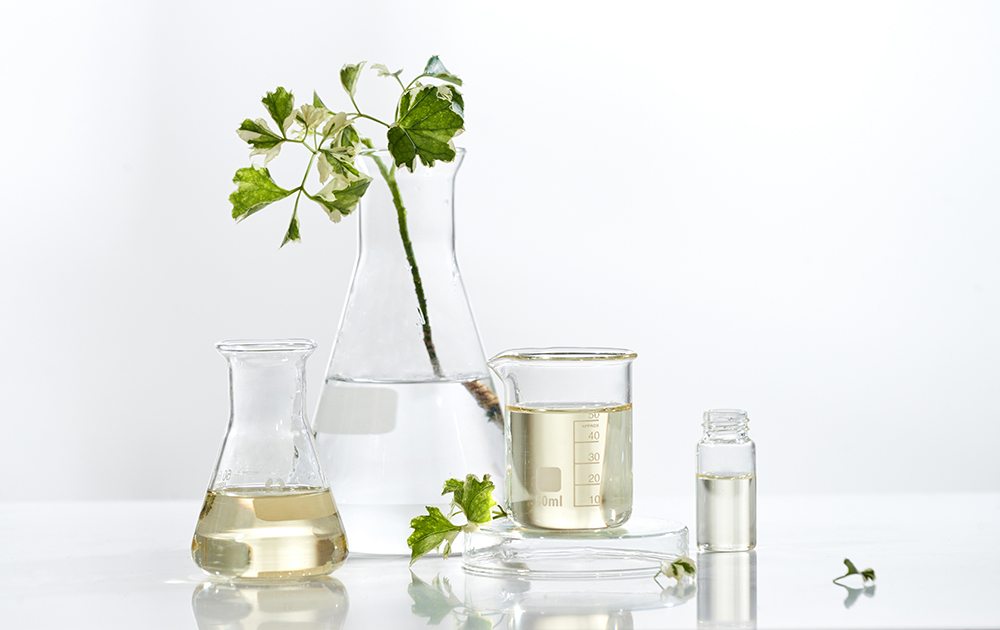Usually the phrase ‘’plant-based’’ associates us with ‘’natural beauty or herbal products’’ Because, of its organic and nature-oriented connotations. It serves as the main and fundamental ingredient used by the organic skincare industry.
However, plant-based skincare products extend beyond these initial perceptions. In simple terms, it shares similarities with the concept of veganism in diets and nutrition, emphasizing skincare products rooted in the essence of plants.
What Plant-Based Skincare Entails?

Plant-based skincare is a holistic approach to beauty and skincare that emphasizes the use of natural botanical ingredients as the foundation for creating products that promote healthy and radiant skin. At its core, it relies on the rich diversity of plant extracts, essential oils, and other botanical components derived from various parts of plants, such as leaves, roots, flowers, seeds, and fruits.
This skincare philosophy prioritizes natural and organic ingredients while minimizing the use of synthetic chemicals, fragrances, and preservatives, aligning with the goal of providing pure and gentle solutions for the skin. Plant-based skincare seeks to harness the inherent healing, nourishing, and rejuvenating properties of these botanicals, making it a compelling choice for those who are mindful of the ingredients they apply to their skin and who seek effective yet eco-conscious beauty solutions.
Clean Beauty: The Real Idea
Using plant-based ingredients in your skincare routine is a real idea. but preservation of plant-based ingredients in skincare should be done professionally. Because, it can lead to bacterial growth, decomposition, and microbial growth. Despite the convincing claims made by brands, proper preservation is a non-negotiable aspect of product safety and effectiveness.
The responsibility for ensuring the accuracy and transparency of skincare product claims can be a complex issue. While some brands may make misleading claims, it's also important for consumers to educate themselves and make informed choices.
The concept of "clean beauty" is gaining traction as a way to address some of these concerns. Clean Beauty emphasizes the use of safe and essential ingredients, including necessary preservatives, while adhering to the highest safety standards in the industry. This approach seeks to provide consumers with products that are effective, safe, and environmentally responsible.
Differentiating Between Natural, Herbal, and Plant-Based Skincare:

- Natural Skincare: Natural skincare products contain ingredients sourced directly from nature and often include plant-based components. However, they may also include mineral-based or non-botanical ingredients. The emphasis is on avoiding synthetic additives.
- Herbal Skincare: Herbal skincare specifically focuses on using herbs and plant extracts known for their medicinal or therapeutic properties. These products are often formulated with specific herbal infusions or extracts tailored to address various skin concerns.
- Plant-Based Skincare: Plant-based skincare goes beyond natural or herbal by primarily relying on a wide range of botanical ingredients, not limited to herbs. It incorporates various parts of plants, including roots, stems, and leaves, to create formulations that aim to optimize the benefits of these diverse plant sources.
Key Components of Plant-Based Skincare Products:

Plant-based skincare products are formulated with a variety of natural ingredients, each offering unique benefits for the skin. Some common components include:
- Botanical Oils: Oils like jojoba, argan, coconut, and rosehip are rich in vitamins, antioxidants, and fatty acids that nourish and moisturize the skin.
- Plant Extracts: Extracts from plants like aloe vera, green tea, and chamomile have soothing and anti-inflammatory properties that calm irritated skin.
- Essential Oils: Essential oils like lavender, tea tree, and rosemary provide aromatherapeutic benefits while also offering antibacterial and skin-enhancing qualities.
- Natural Emollients: Ingredients such as shea butter and cocoa butter offer deep hydration and promote skin elasticity.
- Herbal Infusions: Infusions of herbs like calendula, lavender, and rose can be used to create gentle and calming skincare products.
- Plant-Derived Actives: Plant-based skincare often incorporates botanical actives like hyaluronic acid, retinol (from rosehip), and niacinamide (vitamin B3) to target specific skin concerns.
- Natural Preservatives: To maintain product stability, plant-based skincare may use natural preservatives like vitamin E and grapefruit seed extract, ensuring product safety without resorting to synthetic preservatives.
The Science Behind Plant-Based Ingredients and Their Impact on Skin Health

Exploring the Science of Plant Extracts: The efficacy of plant-based skincare lies in the rich and complex chemistry of botanical extracts. These extracts contain a wide array of compounds, including antioxidants, vitamins, polyphenols, and phytochemicals. These bioactive compounds can have profound effects on the skin.
For instance, antioxidants found in plants, such as vitamins C and E, help neutralize free radicals, reducing oxidative stress and preventing premature aging. Polyphenols, like those in green tea, possess anti-inflammatory and anti-microbial properties, making them suitable for calming irritated skin and addressing acne concerns. Understanding the specific compounds within plant extracts allows skincare formulators to tailor products to address various skin issues effectively.
Key Plant-Based Ingredients Known for Their Skincare Benefits:

- Aloe Vera: Known for its soothing and hydrating properties, aloe vera helps calm irritated skin, making it ideal for treating sunburns and inflammation.
- Tea Tree Oil: This essential oil has potent antimicrobial properties, making it effective against acne-causing bacteria and helping to clarify the skin.
- Hyaluronic Acid: Derived from plant sources like fermented wheat, hyaluronic acid is a moisture-retaining powerhouse that hydrates and plumps the skin.
- Green Tea Extract: Rich in antioxidants, green tea extract protects the skin from environmental damage and helps reduce redness and inflammation.
- Chamomile: Chamomile is prized for its anti-inflammatory and calming effects, making it suitable for sensitive or redness-prone skin.
- Rosehip Oil: Extracted from the seeds of wild rose bushes, rosehip oil contains vitamin A and essential fatty acids, aiding in skin regeneration and scar reduction.
- Licorice Root Extract: This ingredient has skin-brightening properties, helping to fade dark spots and even out skin tone.
- Jojoba Oil: Jojoba oil closely resembles the skin's natural sebum, making it an excellent moisturizer for all skin types.
How Plant-Based Ingredients Can Address Various Skin Concerns:

- Dry Skin: Plant-based oils like argan and avocado replenish lost moisture and strengthen the skin barrier.
- Acne-Prone Skin: Tea tree oil, witch hazel, and salicylic acid (derived from willow bark) can help control excess oil production and reduce breakouts.
- Anti-Aging: Plant extracts like retinol (from rosehip), vitamin C (from citrus fruits), and resveratrol (from grapes) combat fine lines, wrinkles, and skin aging.
- Sensitive Skin: Aloe vera, chamomile, and calendula provide gentle, soothing care for sensitive or easily irritated skin.
- Hyperpigmentation: Licorice root extract, vitamin C, and niacinamide (vitamin B3) help fade dark spots and even out skin tone.
- Inflammation: Green tea extract, chamomile, and lavender oil possess anti-inflammatory properties that can reduce redness and soothe irritated skin.
Is There a Contradiction Between 'Plant-Based' and 'Lab-Grown' Skincare?

The intersection of "plant-based" skincare and laboratory cultivation can initially appear perplexing. The term "plant-based" inherently implies a connection to nature, suggesting that skincare products originate directly from plants or natural sources. However, the fact that these products are developed in a laboratory setting doesn't inherently contradict their essence as plant-based. In reality, the controlled conditions of a lab are essential for working with botanical ingredients, which can exhibit high volatility and variations in concentration in natural environments. This controlled environment ensures precision and consistency in the formulation of plant-based skincare products. Moreover, the application of biotechnology in the lab allows for the extraction and optimization of the most potent elements found in plants, amplifying the benefits of these natural sources and demonstrating how technology can enhance the impact of plant-based skincare.
In essence, while plant-based skincare may be lab-grown, it doesn't compromise its fundamental identity rooted in plants. Instead, it underscores the synergy between natural botanical ingredients and advanced laboratory techniques, which ultimately accelerates the efficacy and reliability of these products. This approach offers consumers innovative and potent skincare solutions that resonate with their preferences for plant-based and environmentally-conscious options, showcasing how science and nature can harmoniously coexist in the realm of beauty and skincare.
What Are the Key Challenges Facing the Beauty Industry?

The beauty industry is grappling with a significant issue - the proliferation of repetitive formulations dressed up in different packaging and branding. This has led consumers to believe that most products are essentially the same, differing only in minor details or perceived brand quality. Influencer culture further exacerbates this problem, as products that gain community attention quickly become sought-after, often based on hype rather than substantive benefits. Many consumers find themselves yearning for a mythical "magic" product, be it a popular skin repair formula or a trendy ingredient, perpetuating a psychological impact that lures them into the belief of a one-size-fits-all solution.
While consumers often rely on simplified labels like "paraben-free" or "cruelty-free" to make choices, these do not provide a holistic understanding of a product's composition. A lack of education on scrutinizing ingredients and understanding skincare science perpetuates this issue. Better industry regulations and standards are needed to prevent brands from entering the market with misleading products, especially in regions like India where the beauty industry is burgeoning. In response to these challenges, the future of the beauty industry may witness a shift towards science-backed technologies like biotechnologically developed skincare. Such evidence-based approaches rely on credible research and established methodologies, allowing science to speak for itself and reducing the reliance on influencer-driven marketing, ultimately leading to a more transparent and informed beauty industry.
Benefits of Sustainable Cruelty-Free Beauty Cosmetic Brands
Certainly, here are the benefits of sustainable cruelty-free beauty cosmetic brands presented without titles:
- No animal testing is conducted, aligning with ethical standards.
- Sustainable ingredient sourcing and eco-friendly packaging reduce the environmental impact.
- Products often contain safer, natural ingredients, reducing the risk of skin irritations.
- Brands provide detailed information about ingredients and practices, building trust.
- Growing awareness of ethical and environmental issues increases demand.
- Brands are well-positioned for global markets with stricter animal testing regulations.
Conclusion
In conclusion, "Plant-Based Skincare: Is It A Thing For Real?" is a question that has garnered significant attention in recent years. The answer is a resounding "yes." Plant-based skincare is not just a buzzword or a passing trend; it represents a fundamental shift in the beauty industry towards more natural, sustainable, and environmentally conscious practices.
As consumers become increasingly aware of the importance of the ingredients they apply to their skin and the environmental impact of their choices, plant-based skincare offers a compelling solution. It emphasizes the use of botanical ingredients derived from plants, harnessing their inherent properties to promote healthy and radiant skin. Moreover, the embrace of sustainable practices, reduced chemical usage, and a commitment to cruelty-free formulations align with the values of many modern consumers.
The future of skincare lies in the harmonious blend of science and nature, where technology enhances the benefits of plant-based ingredients. As we move forward, it is essential to prioritize education and transparency, ensuring that consumers can make informed choices about their skincare routines. Plant-based skincare is not just a fleeting trend; it represents a meaningful transformation towards a more conscious and ethical approach to beauty, one that celebrates the beauty of nature itself.
